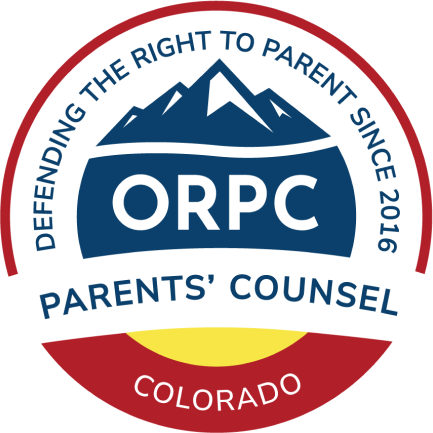Independent Evaluation Shows Interdisciplinary Representation for Parents with Complex Child Welfare Cases Leads to Better Outcomes
For Immediate Release: February 12, 2024Contact: Melissa Thompson, Esq., Executive Director, Office of Respondent Parents’ Counsel, (303-731-8770)
DENVER, Colorado – The Office of Respondent Parents’ Counsel (ORPC) today released new, independent research that shows using an interdisciplinary team to serve parents with complex family circumstances leads to greater success in their child welfare case. An interdisciplinary team pairs an attorney with a social worker or parent advocate to better serve families experiencing challenging circumstances such as substance use, homelessness, domestic violence, and previous child welfare involvement. For example:
- A parent advocate can provide emotional support and motivation to help parents stay engaged with their case and buffer the effects of trauma from previous systems involvement.
- A social worker can help clients navigate mental health and substance use issues and connect them with needed resources (such as transportation) to be successful in their treatment plan.
Tailored support allows the attorney to focus on legal aspects of the case while other interdisciplinary team members provide care and guidance to help set families up for success. The Colorado Evaluation and Action Lab (Colorado Lab) conducted the independent evaluation, using the Linked Information Network of Colorado to connect legal representation data from the ORPC to Colorado Department of Human Services (CDHS) child welfare data over a two-year period (cases closed in 2021 and 2022). The linked dataset provides a first-ever opportunity to use CDHS’s child welfare data to measure outcomes for children and families with parent representation by the ORPC. This approach uses the most rigorous and reliable data sources to measure outcomes of legal representation provided by the ORPC.
“To effectively support the well-being of children and families, our Office prioritizes evidencebased decision making. This is why an independent evaluation was a top priority,” said Melissa Michaelis Thompson, ORPC Executive Director. “This evaluation tells us the use of an interdisciplinary team for families with complex cases helps to keep more kids safely with their family or kin, decreases the likelihood of further involvement in the child welfare system, and provides more equitable outcomes.”
Evaluation findings show a number of successful outcomes when interdisciplinary teams worked with parents with complex cases, including:
- A majority of kids were safely kept with their parents during the case. 60% of children either stayed with their parents throughout a case or were reunified with their parents after a removal.
- Most children were reunified with parents or family following their case. 81.3% of children were reunified with their parents or living with a family member when their case closed.
- Fewer families were re-involved with the child welfare system. Only 2.84% of families served by interdisciplinary teams were involved with the system again within one year of case closure.
- Parents of color and parents with disabilities were served at high rates. Interdisciplinary teams served a high proportion of parents of color (nearly 45%) and parents with disabilities (nearly 50%).
In 2021 – when child welfare cases included in this study began to close – Colorado fell below the national average in placing children in child welfare cases with relatives (35% nationally vs. about 27% in Colorado) and reuniting them with their parents (47% nationally vs. 35% in Colorado). Now, the rate of placing children in child welfare cases with relatives has risen to 50% in Colorado (2023 data).
“This evaluation shows the interdisciplinary model of parent representation is one promising strategy to improve child welfare outcomes in Colorado, especially for families with multiple stressors,” says Dr. Courtney Everson, Senior Project Director for the Colorado Lab. “Ensuring attorneys have access to social workers and parent advocates whenever it meets parent needs is critical to equitably achieving positive outcomes across the state.”
You can view the independent evaluation findings and executive summary here.
To schedule interviews with the evaluation team, the ORPC, or interdisciplinary team representatives, please contact Melissa Thompson, Esq., Executive Director, Office of Respondent Parents’ Counsel, mthompson@coloradoorpc.org, 303-731-8770.
###
The Office of the Respondent Parents’ Counsel (ORPC) is an independent state agency that supports Colorado parents in the fight to preserve families, their dignity, and the constitutional right to parent in dependency and neglect cases. We recruit and train attorneys statewide, advocate for family centered policies, and promote equity and transparency in the system. As a result of our work, more Colorado families become reunified and remain stronger together.


